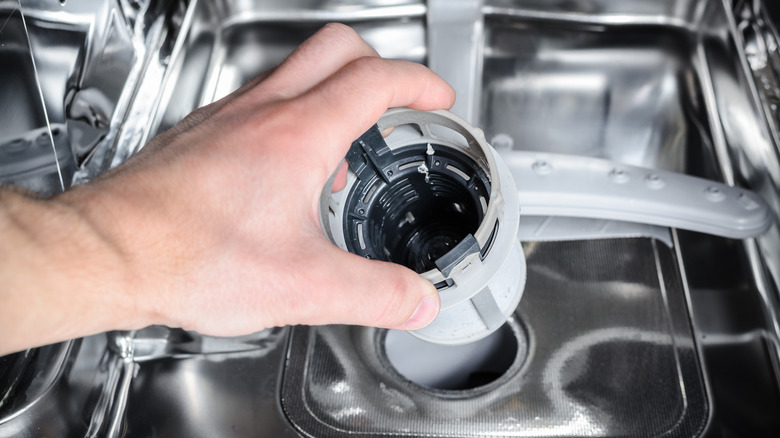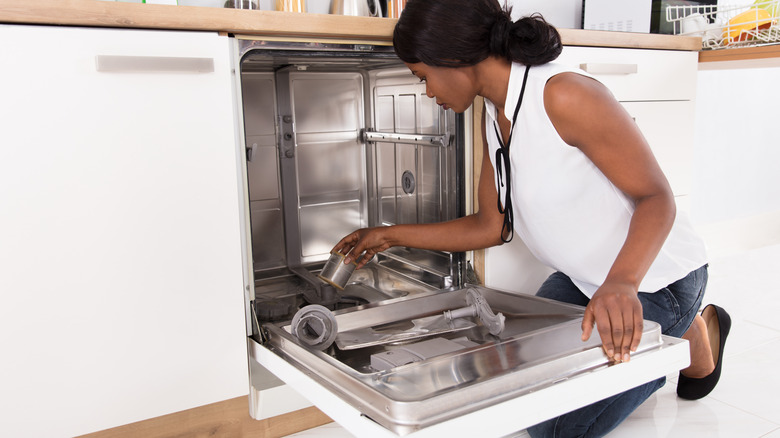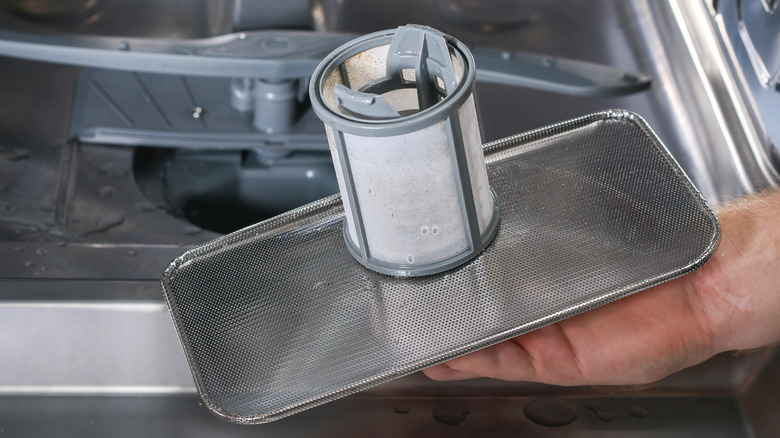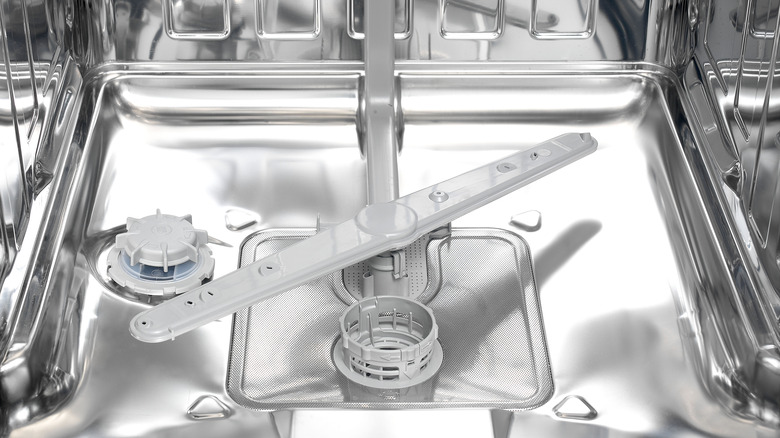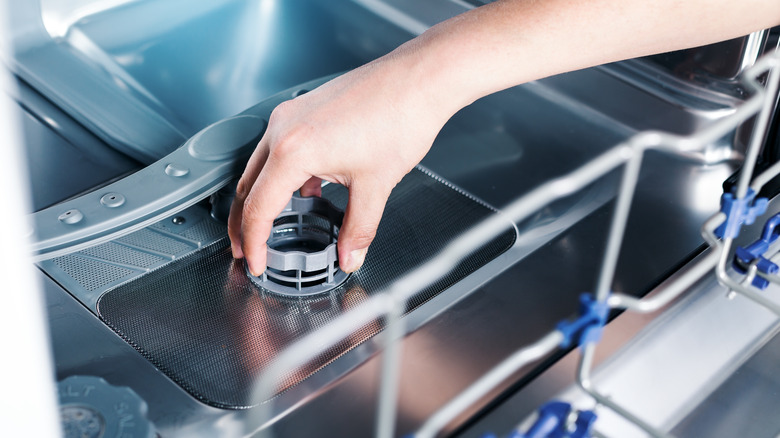How To Clean Your Dishwasher Filter
The dishwasher — a gift from above, isn't it? For many years now, dishwashers have saved us time and effort. We only load the dishwasher, add detergent, and press a button for the most part. We let the dishwasher do its work, and when it's done, we're greeted with spotless plates. It's almost magical. But we might have never considered what happens when the dishwasher is running. Did you even know that your dishwasher includes a filter that should be cleaned regularly?
Dishwashers aren't magical, and all of that filth from the plates needs to go somewhere. TikTok is filled with a plethora of videos on the topic of dirty dishwashers and what is lurking in the internal workings of this cleaning machine. One TikToker, Madelyn Combs, took to disassembling the inner workings of her dishwasher and was in utter shock at the grossness she found within — she's so grossed it almost makes her sick.
Why cleaning the dishwasher filter matters
As you run your dishwasher every day, soap scum, food, dirt, and bacteria develop in the filter, resulting in filthy water, a breeding ground for germs, and foul odors. When dishes are not thoroughly cleaned, there may be lingering germs and bacteria on them, which can make you sick, according to a study mentioned by WebMD. Bugs can also get into the dishwasher through the dishwasher drain and linger in the filter, which can also cause a clogged dishwasher filter situation. Clogged filters and drains also reduce the effectiveness of the dishwasher, so you may still see food particles on your dishes after rinsing them (even in a light load).
Dishwasher filters are designed to collect unwanted food particles and buildup, allowing your dishes to be thoroughly cleaned. And if your filter isn't cleaned regularly, it can decimate the effectiveness of your dishwasher. You'll undoubtedly notice that your dishes aren't as clean as they used to be, and they may also have a lasting stench. That's why it's critical to clean the filter frequently — every few months, at least — to safeguard your health and avoid unpleasant odors, bacteria, and residue.
How to clean your dishwasher filter
Although filter cleaning is required every few months in most cases, some models may need thorough washing every two to three weeks (and how often you're using your machine may factor in, as well). Always read the dishwasher's handbook to ensure that you're cleaning up as often as the manufacturer recommends. The process is pretty straightforward, KitchenAid notes.
- Find the dishwasher filter, remove the lowest rack and use a cloth to clean all the dirt and debris surrounding the filter. Then twist and unlock the filter before pulling it out.
- Soak the filter in a mixture of warm water and a few drops of dish soap, which will dislodge any trapped food particles.
- To clean the filter, use a sponge and a toothbrush. It's important to avoid cross-contamination, so it's best to use an old sponge instead of your typical dish sponge.
- If the dishwasher filter is still not clean enough, use a solution of vinegar and baking soda on it. Once clean, place the filter back in and rotate it to lock it into place.
Cleaning your dishwasher drain should also be done at least once every three to six months; the more you use it, the more often you should clean it. As a general rule, if your dishes have grittiness or filth, it's time to clean your filter and the drain.
How often do you need to clean the dishwasher filter?
You'll want to stay on top of this work. Otherwise, your dishwasher will smell bad, and your dishes may come out gritty or with food residue on them. Cleaning a dishwasher filter once a month is an effective strategy, depending on how often you run your dishwasher. Make a note on your calendar or commit to doing it on the first of every month, Forkly recommended. After a few months, you'll be able to detect if the regularity needs to be adjusted. Regularly cleaning your dishwasher filter can help your dishwasher work at its best, load after load.
When it comes to cleaning your dishwasher filter, here are some tips on knowing when it's time to give that machine a little extra attention. If you rinse all of your dishes well before loading them into the machine, meaning you got all of the food residue and oils off, you can get away with cleaning the filter only once a year, though it still wouldn't hurt to check the filter every once in a while, just in case. On the other hand, if you just scrape stuff but leave some residue on the dishes, you'll want to give the machine a cleaning every three months.
Where is my dishwasher filter located?
Self-cleaning filters are ubiquitous in older dishwashers, mainly in those manufactured before 2010, but they were noisier. During the last decade, manufacturers mostly shifted to quieter filters without grinders that must be manually cleaned. PopularAsk advised looking under the spray arms at the bottom of the dishwasher to see what kind of filter you have. Self-cleaning filters are usually covered by a circular plastic grid or series of perforations. On the other hand, filters that need to be manually cleaned are spherical and resemble the filters found in standard water pitchers.
The dishwasher filter is usually located at the bottom of the dishwasher. It should be fairly obvious, usually in the center or near the dishwasher door, and should not require any tools to remove for cleaning. However, if you're not sure where it is, check the instruction manual for your dishwasher –- it should have a picture and a description of where your filter is located and how to unscrew it.
How to keep your dishwasher filter clean
To maintain your dishwasher filter and possibly have less scrubbing or soaking to do when it comes time to clean it, you'll want to regularly take a moment to clean out the inside of your dishwasher. You can do this anytime it's empty and looking a little shabby. Clean up any food splatters on the inside edges, corners, and hinges of your dishwasher. Scrape off any stuck particles (you can spray them with some white vinegar to help dislodge and dissolve).
Every now and then, your dishwasher will require a thorough cleaning, Better Homes & Garden advised. It also helps to ensure you scrape away any excess food from dishes before loading the washer. Even though newer machines and today's dishwashing liquids can "dissolve" stick-on food, you want to be sure you're doing everything you can to keep from having a stinky or bogged-down appliance. You may also want to run a cleaning cycle once a month when the dishwasher is empty to help cut through any greasy buildup on the interior and filter.

